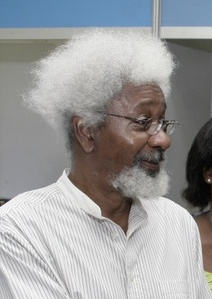 |
| Wole Soyinka (Photo credit: Wikipedia) |
When you
have been following social and political events as long as I have --- I date my
beginning from the day I entered journalism in 1945, that is, 70 years ago ---
you are always running across events that provide you with flavourful
memories.
One such
came in an AlJazeera programme this week about the Nigerian film industry. As
part of the show, a gentleman called Ogunde recalled that even before the
beginning of Nigerian films, a travelling entertainment owned, operated and performed
by his father, Hubert Ogunde, was popular all over the country, but especially in the southern parts.
It took me
back to the year 1966, memorable in the history of Nigeria, for sure, when a
group of young army officers from the Northern Region, headed by Major Chikwuma
Nzeogwu, conducted a half-successful rebellion in which they killed the first
(and much-admired) President of the country, Sir Abubaker Tafewa Balewa, as
well as Chief Festus Okotie Ebo, the federal finance minister, the head of the western region government
Chief Samuel Akintola, as well as several other leading Nigerian politicians.
On the
following morning, a Saturday, I was scheduled to be taken by a federal
information officer to the University for an interview with the playwright Wole
Soyinka, years later a Nobel Prize winner. When the information officer did not
turn up I took a taxi, and at the University I discovered that the heads of the
Nigerian state had, as it were, been chopped off, and all was confusion as to
who was running the country. Later in the day in an effort to discover what had
happened, I was directed to visit Hubert Ogunde, who, I was told would almost
certainly know what had happened. I didn’t know his address, but simply asked a
taxi driver to take me to him, which he did unhesitatingly.
My informants
were right. This remarkable man, a richly comic and at the same time impressive
character, who knew everybody in Nigeria and was known to everybody, naturally
had all the details about what these army officers had done, how they invaded
the President’s home and shot him down, and so on. I felt I could not have had a more reputable
informant, and, in the absence of any other information, hurried off a dispatch to my newspaper in
Montreal. Unfortunately, cable communications between Nigeria and the outside
world had been suspended, so Patrick Keatley, the Guardian’s Commonwealth
correspondent (and, incidentally, a Canadian), who was known to all the
Nigerian politicians and officials, and
myself gathered together all the dispatches that foreign correspondents had written
and flew with them to neighbouring Ghana, a country in those days already
sinking into a sort of paranoid authoritarianism that was not to be trifled
with.
At the
Accra airport on arrival we were placed to one side and told to wait. We waited
and waited, and eventually realized that the room we were in gave directly on
to a taxi rank. So we slipped out, took a taxi into town to the Cable and Wireless
office and phoned the Canadian high commission asking them to make our excuses
for us with the airport authorities.
The
Cable and Wireless office had only a
Sunday staff. Our dispatches would have to wait for the censor, they told us. Where
was he? The censor was a Mr Newman, who was at the beach. We would just have to
wait until he returned home and could be advised of the pile of news dispatches
that he would be required to either veto or rubberstamp. We left the pile, with our own dispatches on
top, and Mr Newman, when he appeared,
was a good-looking, pleasantly spoken fellow, who hurried through the
dispatches and sent them through without a word changed, no doubt taking
advantage of the government’s confusion before the events in neighbouring
Nigeria. We took a plane back to Nigeria
at the first opportunity.
When I had
met Soyinka at the university he was rather nervous as to which side had come
out on top. The western region had recently re-elected Akintola, but Soyinka,
an intensely political guy in those days, had marched into a radio station and
broadcast an alternative version of the
results from those issued officially. When I went with him the following Wednesday
on a tour of the ju-ju clubs, Soyinka was greeted as a hero as we entered each
club, and our table quickly was crowded with contributed bottles of beer gifted
by his many admirers.
It turned
out that the head of the army, Major-General Johnson Ironsi, had been warned of
the coup by a phone call from a subordinate who had been killed not long after
making the call. He took command of the country, suspended the constitution,
thus ending the federal republic, and was himself killed by dissatisfied
Northern officers six months later. Until this year, 49 years later, Nigeria
has been ruled in an almost unbroken line by the military.
No comments:
Post a Comment